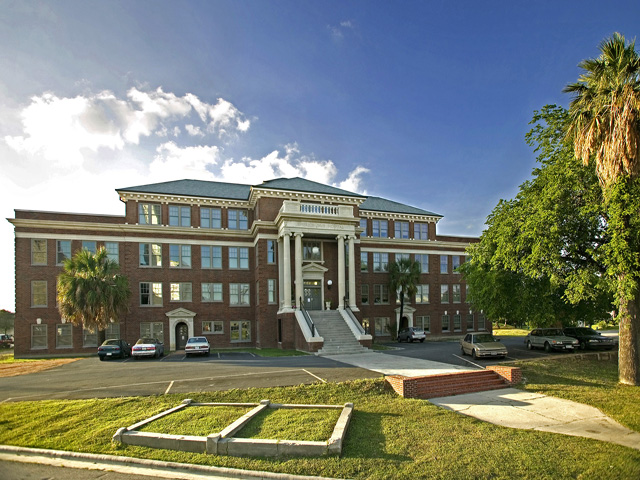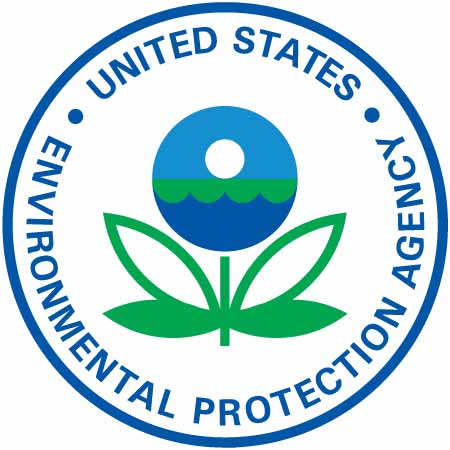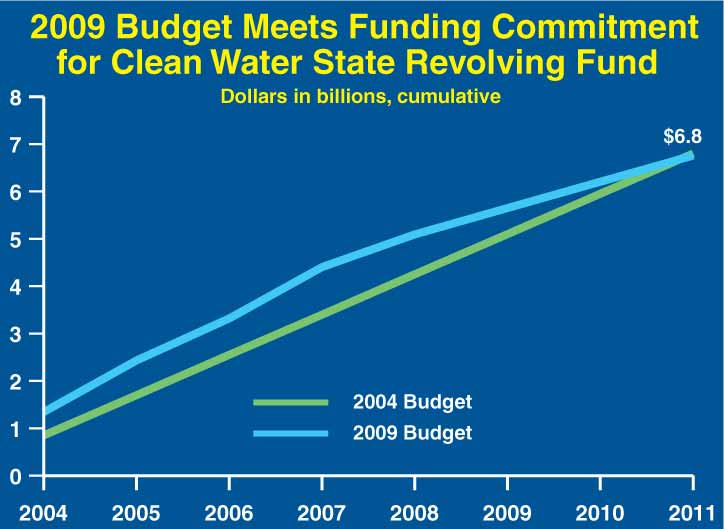ENVIRONMENTAL PROTECTION AGENCY
The President’s 2009 Budget will:
-
Clean up the Nation’s most contaminated hazardous
waste sites;
-
Revitalize communities and encourage business investment
at abandoned industrial sites;
-
Support decontamination research, improve preparedness,
and protect water infrastructure;
-
Help States and communities finance wastewater and
drinking water infrastructure needs;
-
Collaborate with international and domestic partners
to address energy and climate issues; and
-
Protect human health and the environment through application
of the best available science.
Cleaning Up Contaminated Sites
-
Minimizes human exposure and
groundwater migration at hazardous waste sites.
-
Promotes economic development.
$166 million to assess more than 1,000 Brownfields properties,
clean up over 60 properties, and make 225 acres ready for reuse.
-
Removes toxic sediments from
the Great Lakes. $35 million to clean up contaminated
sediment in the region in concert with non-Federal partners, reducing
its negative impact on humans, wildlife, and aquatic organisms.
Protecting the Homeland
-
Continues efforts to protect
against terrorism. Supports critical decontamination, preparedness,
response, and capacity activities, including:
-
$102 million for decontamination research and to
close emergency preparedness gaps;
-
$10 million to increase lab capacity; and
-
$35 million to support the Environmental Protection
Agency’s (EPA’s) Water Security activities.
-
Coordinates protection of
critical water infrastructure.
-
Evaluates pilot systems participating in EPA’s
Water Security initiative.
-
Adds 50 partners to the Water Lab Alliance network
while continuing to provide training and technical assistance to improve
the capabilities and capacity of the water sector.
-
Continues outreach to increase water protection efforts
and local investment in contaminant warning systems.
Providing Clean and Safe Water
Partnering to Promote Energy Efficiency and Reduce Emissions
Intensity
-
Addresses greenhouse gas emissions.
Continues working with the Department of Transportation
to implement the Energy Independence and Security Act of 2007 to reduce
U.S. gasoline consumption and greenhouse gas emissions from motor
vehicles.
-
Continues the Asia Pacific
Partnership. $5 million to continue partnership of seven
nations developing strategies
for improving energy security, reducing pollution, and addressing
the climate.
-
Provides energy-efficient
options to consumers and companies. $44 million to help
the public make informed energy-efficient choices through Energy Star
product labeling efforts and other tools.
-
Supports international methane
recovery efforts. $5 million to lead this international
partnership that works with the private sector, multilateral development
banks, and other governmental and non-governmental organizations to
advance the recovery and use of methane as a clean energy source.
Relying on Science
-
Applies the best available
science. Works closely with partners to protect human health
and the environment through policies that focus on results, maintain
the Nation’s economic competitiveness, and embrace collaboration.
Major Savings and Reforms
Since 2001, the Environmental Protection Agency has:
|
A nonprofit organization in Houston, Texas used a Brownfields grant to assess, clean up, and redevelop a former hospital. This resulted in affordable loft-style apartments that opened in October 2005 and were fully leased by November 2005.
 |
|
-
Initiated implementation of the Administration’s
Clean Air Interstate Rule, which
is projected to reduce SO2 emissions from power plants in affected States by
over 70 percent and NOx emissions by over 60 percent from 2003 levels.
-
Helped more than 8,500 drinking water utilities complete
risk assessments, update emergency response plans, and improve emergency
preparedness for manmade and naturally occurring events affecting
water supplies.
-
Supported business investment and community revitalization
by tripling the number of Brownfields properties assessed during the
prior Administration, making over 2,300 properties ready for reuse,
and leveraging over $6.7 billion in private investment and over 31,000
redevelopment and cleanup jobs.
-
Instituted a series of performance requirements that
resulted in the agency earning the President’s Quality Award
in 2007, the highest management award given to Executive Branch agencies
for exceptional management across the entire organization.
Environmental Protection Agency
(Dollar amounts in millions)
| |
2007
Actual |
Estimate |
| 2008 |
2009 |
|
|
|
|
|
| Spending |
|
|
|
| Discretionary
Budget Authority: |
|
|
|
| Operating Program 1 |
4,298 |
4,270 |
4,251 |
| Clean Water State
Revolving Fund |
1,084 |
689 |
555 |
| Drinking Water
State Revolving Fund |
837 |
829 |
842 |
| Brownfields Assessment
and Cleaunup |
89 |
94 |
94 |
| Clean Diesel Grants |
7 |
49 |
49 |
| California Diesel
Emission Reduction Grants |
— |
10 |
— |
| Targeted Water
Infrastructure |
84 |
177 |
26 |
| Requested (non-add) |
84 |
44 |
26 |
| Unrequested (non-add) |
— |
133 |
— |
| Superfund |
1,255 |
1,254 |
1,264 |
| Leaking Underground
Storage Tanks |
72 |
106 |
72 |
| Cancellation of
unobligated balances |
— |
−5 |
−10 |
| Total, Discretionary
budget authority |
7,726 |
7,472 |
7,142 |
| |
|
|
|
| Total, Discretionary
outlays |
8,509 |
7,636 |
8,143 |
| |
|
|
|
| Total, Mandatory
outlays |
−250 |
−95 |
−144 |
| |
|
|
|
| Total, Outlays |
8,259 |
7,541 |
7,999 |
| |
|
|
|
| |
Number of Programs |
|
2009 Savings |
| Major Savings, Discretionary |
|
|
|
| Terminations |
2 |
|
−143 |
| Reductions |
3 |
|
−160 |
|
|
|
|
|
1 Includes $11 million in pass-through grants in 2008 provided in Sections
435 and 436 of the Department of the Interior, Environment, and Related
Agencies Appropriations Act, 2008 as contained in P.L. 110-161.
|
 Skip Main Navigation
Skip Main Navigation


